Top 10 Viking Heroes and Villains
Vikings, amazing rulers from Norwegian mountains, were very misunderstood and wrongly portrayed. They were not the blood-thirsty people we believe them to be. They also have much culture and myths. there are important gods and goddesses, hero's and villains, who I will list here.
Though not the most important god, Thor is the most famous, mainly through the marvel character, but in other ways.
Because Thor is great keep the good work.
How can there be any debate about this?
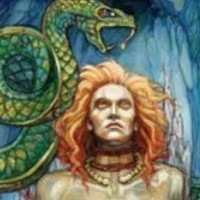
Not only he is the God of Mischief which caused the permanent death of Baldr, he's also the one who will bring about Ragnarok. I mean even though Odin is the creator, he's no match to his half-god, half-giant blood brother!
Blood brother of Odin, trickster and master of lying and betrayal.
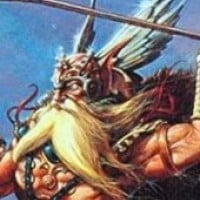
Odin is one of Norse mythology's most significant characters. He fathered Thor and is the most powerful of the gods. Thor would be left helpless to him in battle. Odin's determination and perseverance was so great, he would stop before achieving his dream, achieving eternal wisdom. He did more than drink from the well of wisdom, he plucked his eye out to do so, he hung himself from a tree too and came back, so Odin's a ghost and god! He will fight the most powerful of monsters at Ragnarok!
Where's the doubt? Odin is the creator of man and god, and along with Ville and Ve, one of the first gods.
Virtues are good only to make us slaves unless we also have freedom.
Hail Heimdallr!
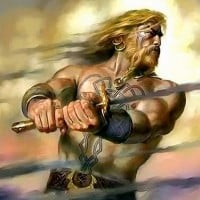
Beowulf has the strength to rip the arms of trolls, hold his breath for days, and killed many monsters such as seven sea monsters, Grendel, his mother search up his mother hearing some hero killed some monsters mother in cold blood doesn't sound heroic, and a dragon that's why.
The brave viking god swordsman, Tyr is the bravest. He put his hand into a wolves mouth to save the gods; has hand was bitten off, he didn't scream.
Idun; with out her, the gods would be dead.
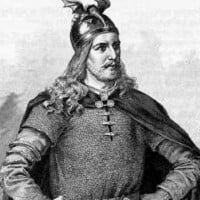
When the world ends, Surtur will seize it in flames, and Ragnarok will be over.
Otherwise known as "Frigg", "Frija", "Frea", or "Frige", though not to be confused with Freyja/Freya or Her handmaiden Fulla. While Odin is known as the All-Father, She is referred to as the All-Mother, and is His wife. She weaves the clouds into existence and can see into the future. She is also the mother of Baldr and Hodr.
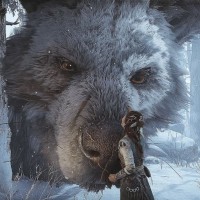
FENRIR I wear a necklace with his head a pendant. He showed that God's are not immortal but can be bitten...I mean beaten...lol. He pretty much is an Aetheists dream. he's a giant wolf. Who in my mind was misunderstood. Instead of leaving him in Asgard roaming around and binding him because of fear of Ragnarok, Odin should have raised him from when he was younger since he had a love for wolves. No he had to trick him and bind him. Which would piss anyone off. I also have a tattoo of his emblem ( clouds emblem from final fantasy ) on my chest. Maybe get his name on my forearm written in Norse runes. I love this thing he's a beast..
Fyeyr also pronounced as Grey, is the God of healing, abundance,wealth,etc. He is the most important Vanir God and can defeat Odin at any time and any where. And he also has a sword that can fight by itself,so what more can you expect?

Defeated Odin. He was mortal, and defeated the mightiest of the gods.
Killed by Loki in his streak of insanity, Baldur is the god of beauty. maybe he was beautiful back then, but I gotta say, I don't think he does at all.
Love him. Such a funny character.
Father and the lord of the Frost Giants, also Lokis real Father.
Though not as well known as Odin, Thor, or Loki, Frey is the god of fertility, crops, peace, and prosperity. He also rules over Alfheim, the home of the light elves. He is also the god of spring and summer, and twin brother of the goddess Freya, the goddess of love. Attached to his chariot is a golden boar. So really, Frey is kinda cool.
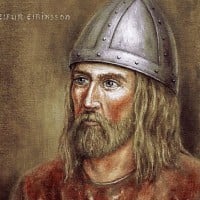 Leif Erikson or Leif Ericson was a Norse explorer from Iceland. He was the first known European to have set foot on continental North America, before Christopher Columbus.
Leif Erikson or Leif Ericson was a Norse explorer from Iceland. He was the first known European to have set foot on continental North America, before Christopher Columbus.